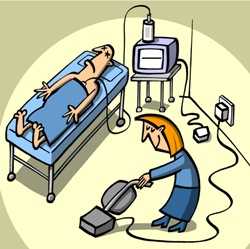Related Topics
Philadelphia Legal Scene
The American legal profession grew up in this town, creating institutions and traditions that set the style for everyone else. Boston, New York and Washington have lots of influential lawyers, but Philadelphia shapes the legal profession.
Medical Economics
Some Philadelphia physicians are contributors to current national debates on the financing of medical care.
Medical reform Subjects (1)
New topic 2019-05-24 20:49:32 description
American Medicine Before 1965
New topic 2019-05-25 13:19:03 description
Medical Tort Reform (1)
The U.S. House of Representatives will soon consider a medical malpractice reform (limiting awards for pain and suffering to $250.000) which it adopted seven times in the last ten years. Following almost certain House passage, the proposal will then confront the Senate,

|
| cartoon malpractice |
where it has failed seven times. The politics of the two chambers are not chief concerns of this paper, which strongly advocates passage. The paper contends that unwise incentives for patients to bring suit are important causes of present difficulty, and reducing such incentives offers a comparatively simple opportunity to bring the complex issue to quick stability. Stability is essential before more sweeping changes can be examined. The collection of data in certain areas would reduce the scope for vituperation and ideology, another important step toward a solution. Full recognition must eventually be given to the intertwined complexity of industrial product liability, the McCarran Ferguson Act, hospital and corporate governance in general, the tort system, pass-through of Medicare and Medicaid overhead reimbursement to malpractice premiums, even universal health insurance. Some small step must begin such an interlocked rearrangement, and a cap on pain and suffering has the major advantage of being successfully tested by twenty-five years of experience in California and Indiana.
This paper makes no claim of identifying all the root causes or predicting all the calamitous consequences of inaction. Advocating passage of national laws to reduce plaintiff incentive to sue, it chiefly focuses on the chief arguments historically made against the present proposal, offers some comparatively novel insights in favor, and makes suggestions for collecting data to reduce the latitude for disagreement.
Congress will again take up malpractice tort reform (MICRA) in 2005. perhaps successfully. The 2004 outcome was close. Since the Republicans subsequently made electoral gains in both House and Senate, the leadership is considered likely to re-introduce the same bill and try to hammer it through. The bill's medical essence is to limit awards for "pain and suffering" to $250,000, contrasting strongly with recent escalating awards which have sometimes reached $100 million. Newcomers to the issue may be surprised that so much emphasis gets placed on this point, but thirty years of wrangling experiences in state legislatures have produced this reform alone with proven effectiveness. In the course and semi-jocular language of politics, "nothing helps the malpractice problem unless it involves on
Originally published: Wednesday, June 21, 2006; most-recently modified: Saturday, May 25, 2019